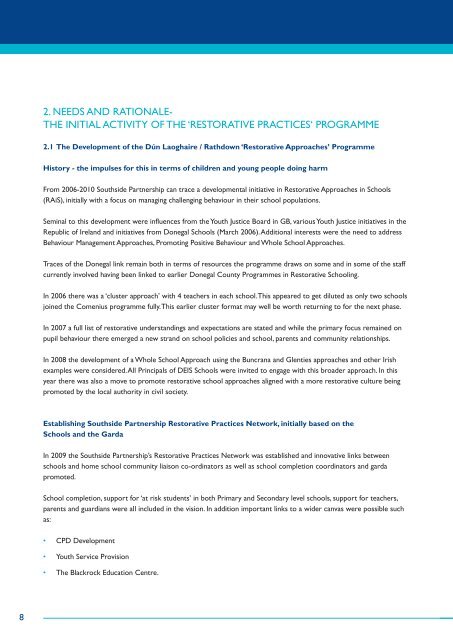Download the PDF document titled 'A Formative Evaluation - Dlvec.ie
Download the PDF document titled 'A Formative Evaluation - Dlvec.ie
Download the PDF document titled 'A Formative Evaluation - Dlvec.ie
Create successful ePaper yourself
Turn your PDF publications into a flip-book with our unique Google optimized e-Paper software.
8<br />
2. NEEDS AND RATIONALE-<br />
THE INITIAL ACTIVITY OF THE ‘RESTORATIVE PRACTICES‘ PROGRAMME<br />
2.1 The Development of <strong>the</strong> Dún Laoghaire / Rathdown ‘Restorative Approaches’ Programme<br />
History - <strong>the</strong> impulses for this in terms of children and young people doing harm<br />
From 2006-2010 Southside Partnership can trace a developmental initiative in Restorative Approaches in Schools<br />
(RAiS), initially with a focus on managing challenging behaviour in <strong>the</strong>ir school populations.<br />
Seminal to this development were influences from <strong>the</strong> Youth Justice Board in GB, various Youth Justice initiatives in <strong>the</strong><br />
Republic of Ireland and initiatives from Donegal Schools (March 2006). Additional interests were <strong>the</strong> need to address<br />
Behaviour Management Approaches, Promoting Positive Behaviour and Whole School Approaches.<br />
Traces of <strong>the</strong> Donegal link remain both in terms of resources <strong>the</strong> programme draws on some and in some of <strong>the</strong> staff<br />
currently involved having been linked to earl<strong>ie</strong>r Donegal County Programmes in Restorative Schooling.<br />
In 2006 <strong>the</strong>re was a ‘cluster approach’ with 4 teachers in each school. This appeared to get diluted as only two schools<br />
joined <strong>the</strong> Comenius programme fully. This earl<strong>ie</strong>r cluster format may well be worth returning to for <strong>the</strong> next phase.<br />
In 2007 a full list of restorative understandings and expectations are stated and while <strong>the</strong> primary focus remained on<br />
pupil behaviour <strong>the</strong>re emerged a new strand on school polic<strong>ie</strong>s and school, parents and community relationships.<br />
In 2008 <strong>the</strong> development of a Whole School Approach using <strong>the</strong> Buncrana and Glent<strong>ie</strong>s approaches and o<strong>the</strong>r Irish<br />
examples were considered. All Principals of DEIS Schools were invited to engage with this broader approach. In this<br />
year <strong>the</strong>re was also a move to promote restorative school approaches aligned with a more restorative culture being<br />
promoted by <strong>the</strong> local authority in civil soc<strong>ie</strong>ty.<br />
Establishing Southside Partnership Restorative Practices Network, initially based on <strong>the</strong><br />
Schools and <strong>the</strong> Garda<br />
In 2009 <strong>the</strong> Southside Partnership’s Restorative Practices Network was established and innovative links between<br />
schools and home school community liaison co-ordinators as well as school completion coordinators and garda<br />
promoted.<br />
School completion, support for ‘at risk students’ in both Primary and Secondary level schools, support for teachers,<br />
parents and guardians were all included in <strong>the</strong> vision. In addition important links to a wider canvas were possible such<br />
as:<br />
• CPD Development<br />
• Youth Service Provision<br />
• The Blackrock Education Centre.


